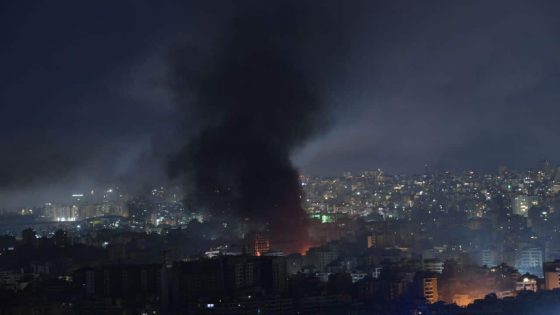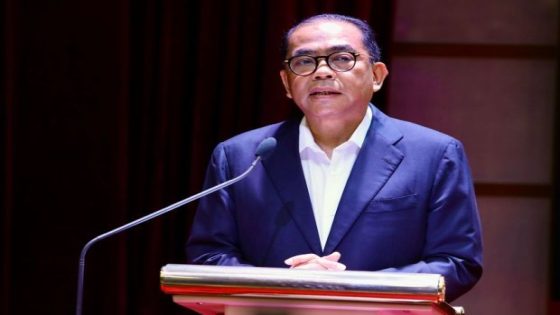Israel bombed central Beirut in the early hours of Thursday, killing at least six people, after its forces suffered their deadliest day on the Lebanese front in a year of clashes against the .
At least six people were killed and seven wounded, Lebanese health officials said. A photo being circulated on Lebanese WhatsApp groups, which Reuters could not immediately verify, showed a heavily damaged building with its first floor on fire.
Reuters witnesses reported hearing a massive blast, and a security source said it targeted a building in central Beirut’s Bachoura neighbourhood close to parliament, the nearest Israeli strikes have come to Lebanon’s seat of government.
Meanwhile, Agence France-Presse (AFP) journalists heard a loud explosion and reported some buildings shaking.
The Israeli military said it was conducting precise airstrikes on Beirut and issued orders in the early hours of Thursday telling people to leave multiple areas in Beirut’s densely populated southern suburbs, where it says it will hit Hezbollah sites.
“You are located near facilities and interests belonging to Hezbollah, which the army will act against in the near future,” Israeli military spokesman Avichay Adraee said in a post on X, naming the Haret Hreik, Burj al-Barajneh and Hadath Gharb areas.
Three missiles also hit the southern suburb of Dahiyeh, where , and loud explosions were heard, Lebanese security officials said.
Beirut’s southern suburbs — which the AFP describes as a Hezbollah “stronghold” — came under more than a dozen Israeli strikes on Wednesday. Lebanon’s health ministry said Israeli air raids killed at least 46 people in the south and centre of the country over the past 24 hours.
Israel suffers deadliest day of losses on Lebanese border
Also on Wednesday, Israel said eight of its soldiers were killed in ground combat in south Lebanon as both regular infantry and armoured units thrust into its northern neighbour.
The losses were the deadliest suffered by the Israeli military on the Lebanon front in the past year of border area clashes between Israel and Hezbollah.
Hezbollah said it had destroyed three Israeli Merkava tanks with rockets near the border town of Maroun El Ras, repelled Israeli forces near several border towns and also fired rockets at military posts inside Israel.
The paramilitary group’s media chief Mohammad Afif said those battles were only “the first round” and that Hezbollah had enough fighters, weapons and ammunition to push back Israel.
Israel’s military has said its incursion is largely aimed at destroying tunnels and other infrastructure on the border and there were no plans for a wider operation targeting the Lebanese capital Beirut to the north or major cities in the south.
Nevertheless, it issued new evacuation orders for around two dozen towns along the southern border, instructing inhabitants to head north of the Awali River, which flows east to west some 60 km north of the Israeli frontier.
More than 1,900 people have been killed and over 9,000 wounded in Lebanon in almost a year of cross-border fighting, with most of the deaths occurring in the past two weeks, according to Lebanese government statistics.
Lebanon’s caretaker prime minister, Najib Mikati, said about 1.2 million Lebanese had been displaced by Israeli attacks.
Israel also carried out an airstrike on a residential building in the west of Syria’s capital Damascus on Wednesday, killing four people, according to the Syrian Observatory for Human Rights.
The Britain-based war monitor said one of them was Hassan Jaafar al-Qasir, son-in-law of the slain Hezbollah leader.
Three civilians were also wounded by the airstrike, the Syrian state news agency SANA quoted a military source as saying.
Israel has been carrying out strikes against Iran-linked targets in Syria for years, but has ramped up such raids since last year’s October 7 attack by the Palestinian militant group Hamas on southern Israel.
The assault, in which Israel says 1,200 people were killed and more than 250 taken hostage, triggered a war that has devastated Gaza, displacing most of its 2.3 million population and killing more than 41,600 people, according to Gaza health authorities.
Israel vows revenge for Iranian missile attack
The border clashes came a day after
Iran said on Wednesday its missile volley — its biggest-ever assault on Israel — was over, barring further provocation, but Israel and the United States have promised to hit back.
The only known fatality from Iran’s attack — which was largely foiled by Israel’s air defence systems — was a Palestinian in the occupied West Bank, who was killed when “pieces of a rocket fell from the sky and hit him”, Jericho’s governor Hussein Hamayel said.
The 38-year-old from Gaza was buried on Wednesday.
Two people were wounded by shrapnel and a school building was damaged by the attacks, and several Iranian missiles struck inside air force bases without causing any casualties or damage, the Israeli military said.
Following the attacks, said: “We are at the height of a difficult war against Iran’s axis of evil, which wants to destroy us”.
“This will not happen because we will stand together and with God’s help, we will win together,” he said.
Israeli defence minister Yoav Gallant warned that “those who attack the state of Israel, pay a heavy price.”
Iranian President Masoud Pezeshkian also warned of a “stronger” response, though he stressed Iran was “not looking for war”.
Iran’s military chief of staff, Major General Mohammad Bagheri, threatened to fire “with bigger intensity” and warned of “vast destruction” if Israel makes good on its pledge to retaliate.
The missile assault was a response to Israeli killings of militant leaders, including Hezbollah chief Hassan Nasrallah, attacks in Lebanon against the group and Israel’s assault on Hamas in Gaza, Iran said.
Iran’s Revolutionary Guards also cited the recent killing of Quds Force commander Abbas Nilforoushan in Lebanon — as well as the assassination of — as justification for the attack.
Shahram Akbarzadeh, a professor of Middle East politics at Deakin University, Iran’s overt involvement in the recent missile strikes was “a game changer” in its tactics.




